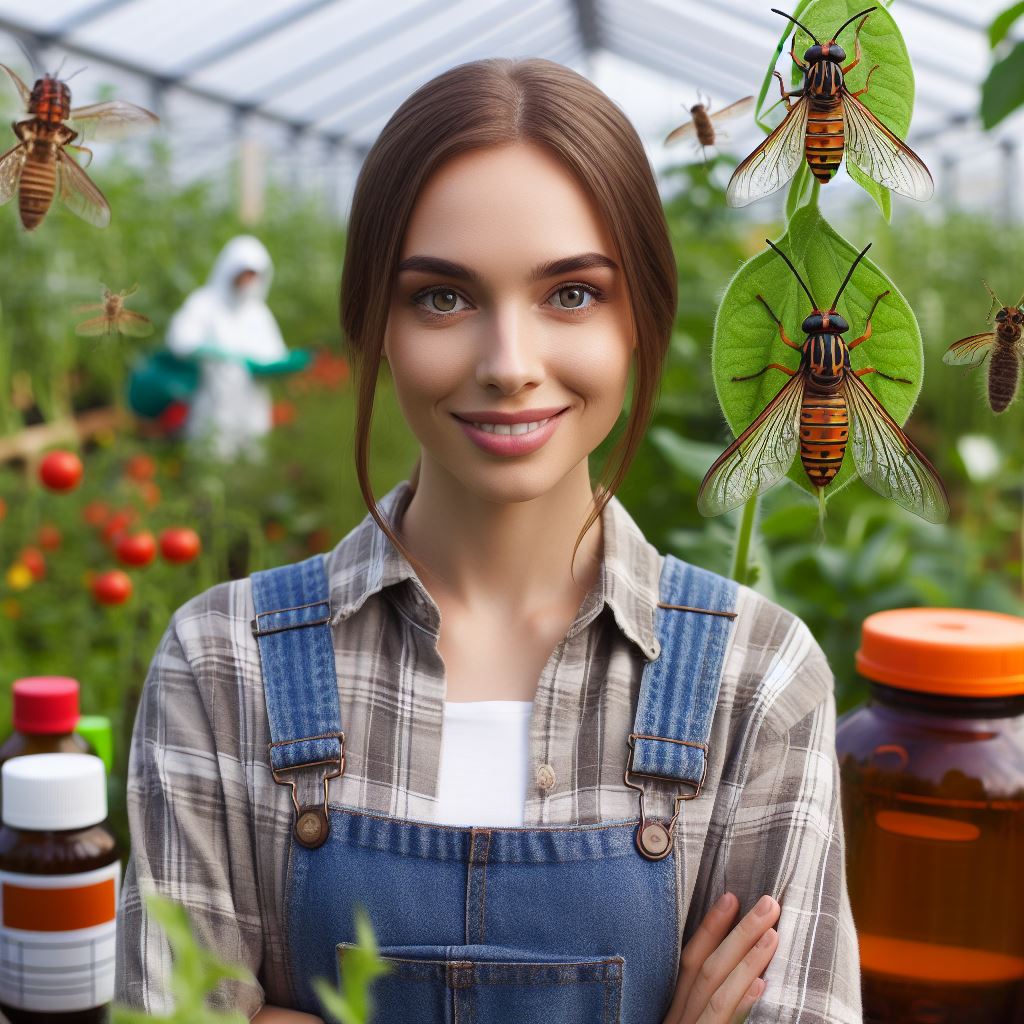Introduction
Modern farming techniques have revolutionized the agricultural industry, allowing for increased crop production and improved food security.
However, with these advancements come various environmental challenges that need to be addressed.
One of the key concerns is the use of pesticides and its adverse effects on ecosystems.
This is where eco-friendly IPM techniques come into play.
Eco-friendly IPM techniques prioritize sustainable methods to manage pests, reducing the reliance on chemical pesticides.
By integrating biological, cultural, and mechanical control measures, farmers can effectively manage pests while minimizing the impact on the environment.
This approach encourages natural pest predators and beneficial organisms to thrive, creating a balanced ecosystem within farms.
Integrated Pest Management (IPM) refers to the strategic combination of different pest management tactics to achieve long-term pest control with minimal environmental impact.
By utilizing various approaches such as crop rotation, habitat manipulation, and biological controls like pheromone traps, farmers can reduce the need for chemical pesticides.
Modern farms, with their large-scale operations and intensive cultivation practices, have significant effects on the environment.
Excessive pesticide use can lead to water pollution, soil degradation, and harm non-target organisms.
Additionally, the loss of biodiversity and destruction of natural habitats are other consequences.
To mitigate these impacts, adopting eco-friendly IPM techniques is crucial.
These practices not only protect the environment but also promote healthier ecosystems and sustainable agricultural systems.
By implementing alternative pest control methods and reducing chemical input, farmers can maintain crop productivity while safeguarding ecosystem integrity.
Transform Your Agribusiness
Unlock your farm's potential with expert advice tailored to your needs. Get actionable steps that drive real results.
Get StartedIn short, the implementation of eco-friendly IPM techniques is of utmost importance in modern farms.
By prioritizing sustainable pest management practices and reducing pesticide reliance, farmers can contribute to a more environmentally friendly agricultural industry.
This shift towards eco-friendly approaches is essential for the long-term sustainability of both farm operations and the natural environment.
Benefits of Eco-Friendly IPM Techniques
Reduction in pesticide use
By implementing eco-friendly IPM techniques, farmers can experience numerous benefits.
The reduction in pesticide use is one of the most significant advantages.
Instead of relying solely on chemical pesticides, these techniques focus on integrated pest management, combining various natural control methods.
This approach not only minimizes the use of harmful chemicals but also reduces the risk of pest resistance.
Preservation of biodiversity
Preservation of biodiversity is another crucial benefit. Eco-friendly IPM techniques promote a diverse ecosystem by harnessing the power of natural predators and beneficial insects.
This natural balance helps control pest populations without disrupting the delicate ecological harmony.
It allows farmers to maintain a healthy environment and protect endangered species.
Improved soil health
Improved soil health is also achieved through eco-friendly IPM techniques.
By avoiding the use of harmful chemicals, organic matter such as compost can be incorporated into the soil.
This enriches the soil with essential nutrients, enhances its fertility, and improves water retention capacity.
As a result, farmers can enjoy higher crop yields, reduce soil erosion, and contribute to sustainable agriculture.
Protection of human health
Furthermore, by prioritizing human health, eco-friendly IPM techniques ensure the well-being of farmers and consumers.
Excessive exposure to pesticides can have serious health consequences, including respiratory issues, neurological disorders, and hormonal imbalances.
By reducing pesticide use, these techniques minimize the risk of such health problems, providing a safer working environment for farmers and healthier food for consumers.
In fact, eco-friendly IPM techniques offer numerous benefits to farmers, the environment, and society.
These techniques reduce pesticide use, preserving biodiversity, improving soil health, and protecting human health.
By adopting eco-friendly practices, modern farms can strive for sustainability while still maintaining productivity.
It is essential for farmers and policymakers to support and promote these techniques to create a healthier and more sustainable future for agriculture.
Read: Soil Conservation: Tackling Erosion Smartly
Eco-Friendly IPM Techniques
In order to promote sustainable and environmentally-friendly agriculture, modern farms are adopting Integrated Pest Management (IPM) techniques that prioritize the use of eco-friendly methods.
These techniques aim to control pests effectively while minimizing the impact on the ecosystem and human health.
Showcase Your Farming Business
Publish your professional farming services profile on our blog for a one-time fee of $200 and reach a dedicated audience of farmers and agribusiness owners.
Publish Your ProfileBiological control methods
Introduction of beneficial insects
By releasing beneficial insects into the farm, such as ladybugs or lacewings, farmers can naturally regulate pest populations.
These insects act as predators, feeding on harmful pests and reducing their numbers.
Use of microbial agents
Farmers can also utilize microbial agents, such as fungi or bacteria, to control pests.
These agents are specific to certain pests and help in suppressing their populations without harming beneficial organisms.
Cultural control practices
Crop rotation
Rotating crops from one season to another helps break the pest life cycle.
Different pests are usually specific to certain crops, so by changing the crop, farmers can disrupt their breeding and reduce their populations.
Planting trap crops
Planting trap crops that attract pests away from the main crops can be an effective strategy.
These trap crops act as sacrificial plants, luring pests away and protecting the valuable crops.
Mulching
Mulching involves covering the soil surface around plants with organic materials like straw or leaves.
This helps to conserve moisture, regulate temperature, and suppress weed growth. It also creates an unfavorable environment for pests.
Proper irrigation and drainage systems
Maintaining adequate irrigation and drainage systems ensures that plants receive enough water while preventing waterlogging.
This helps to minimize conditions favorable for pests, such as stagnant water or excessive moisture.
Mechanical control measures
Physical barriers
Installing physical barriers, such as nets or fences, can prevent pests from accessing plants.
This is particularly useful for protecting high-value crops from birds, rabbits, or larger pests.
Traps and lures
Placing traps and lures, such as pheromone traps or sticky traps, can help monitor and capture pests.
These traps can be used to detect pest populations early on or to directly reduce their numbers.
Chemical control as a last resort
Non-toxic alternatives
If all else fails, farmers can resort to non-toxic alternatives, such as botanical insecticides or insecticidal soaps, which have minimal environmental impact.
Minimal and targeted pesticide use
When pesticides are necessary, farmers should use them sparingly and selectively, targeting specific pests rather than applying them broadly.
This minimizes the negative effects on non-target organisms and reduces the overall pesticide load.
By incorporating these eco-friendly IPM techniques into modern farming practices, farmers can effectively manage pests while safeguarding the environment, preserving biodiversity, and ensuring sustainable food production.
Read: Permaculture Principles: Soil Health Focus
Implementation Challenges and Solutions
Resistance from traditional farmers
Traditional farmers may resist adopting eco-friendly IPM techniques due to their unfamiliarity with these methods.
Some traditional farmers may be hesitant to change their tried and tested farming practices.
Education and awareness programs can help address the resistance and showcase the benefits of eco-friendly IPM techniques.
Farmer-to-farmer knowledge sharing and success stories can also encourage traditional farmers to embrace these techniques.
Lack of awareness and knowledge
Many farmers may not have sufficient awareness and knowledge regarding eco-friendly IPM techniques.
Farmers might not be aware of the potential risks associated with chemical pesticides and the benefits of alternative methods.
Training programs, workshops, and extension services can play a crucial role in spreading awareness and knowledge.
Providing comprehensive information, case studies, and success stories can empower farmers to make informed decisions.
High initial costs
Implementing eco-friendly IPM techniques may require substantial investments, especially in the initial stages.
Costs associated with purchasing organic fertilizers, biopesticides, and equipment can be significant.
However, it is crucial to consider the long-term benefits and potential cost savings from reduced pesticide use.
Farmers can explore options for financial assistance through grants, loans, and crop insurance policies for eco-friendly farming practices.
Government support and subsidies
To encourage farmers to adopt eco-friendly IPM techniques, governments can offer support and subsidies.
Government agencies can provide financial assistance for purchasing organic inputs and equipment.
Subsidies on agrochemicals and pesticides can be gradually reduced to promote eco-friendly alternatives.
Collaboration between government agencies, research institutions, and farmer associations can streamline support programs.
In essence, the implementation of eco-friendly IPM techniques in modern farms faces various challenges.
These challenges include resistance from traditional farmers, lack of awareness and knowledge, high initial costs, and the need for government support and subsidies.
However, with proper education, awareness programs, and financial assistance, these challenges can be overcome.
Showcase Your Farming Business
Publish your professional farming services profile on our blog for a one-time fee of $200 and reach a dedicated audience of farmers and agribusiness owners.
Publish Your ProfileThe adoption of eco-friendly IPM techniques can lead to sustainable farming practices, reduced environmental impact, and improved food safety.
It is imperative for farmers, governments, and stakeholders to work together to overcome these implementation challenges and ensure a greener future for agriculture.
Read: Cover Crop Mixes: Soil Health Multipliers

Case Studies and Success Stories
Organic farms adopting eco-friendly IPM techniques
- Parkside Organics, a family-owned farm, successfully implemented eco-friendly IPM techniques.
- They focused on using natural predators, crop rotation, and trap crops to control pests.
- By reducing pesticide use, they experienced healthier crops and improved soil health.
- Parkside Organics is now a leading example of sustainable farming practices in their community.
Increased profitability with reduced pesticide costs
- Green Acres Farm switched to eco-friendly IPM techniques and observed significant cost savings.
- They eliminated the need for expensive chemical pesticides by employing natural alternatives.
- The decreased reliance on pesticides resulted in reduced production costs for Green Acres Farm.
- This increased their overall profitability, as they could allocate saved funds to other farm operations and investments.
Positive environmental impact
- Evergreen Farm implemented eco-friendly IPM techniques and noticed a positive environmental impact.
- By reducing chemical pesticide usage, they minimized potential harm to soil, water, and air quality.
- The ecosystem surrounding the farm also benefitted from the natural pest control methods employed.
- Evergreen Farm is now renowned for its commitment to environmental sustainability in agriculture.
Organic farms adopting eco-friendly IPM techniques
Case studies and success stories provide concrete evidence of the benefits of eco-friendly IPM technique in modern farms.
Organic farms, like Parkside Organics, have successfully transitioned to these practices, emphasizing the use of natural predators, crop rotation, and trap crops to manage pests.
This approach not only minimizes the need for chemical pesticides but also improves crop health and soil fertility.
Increased profitability with reduced pesticide costs
Green Acres Farm serves as another success story, demonstrating increased profitability resulting from reduced pesticide costs.
By adopting eco-friendly IPM technique, they eliminated the need for expensive chemical pesticides and significantly lowered production costs.
The funds saved could be redirected to other essential farm operations and investments, enhancing overall profitability.
Positive environmental impact
Apart from economic advantages, eco-friendly IPM techniques also have a positive environmental impact.
Evergreen Farm, through these practices, reduced the potential harm to soil, water, and air quality associated with chemical pesticides.
This environmentally conscious approach benefits both the farm and the surrounding ecosystem.
These case studies and success stories showcase the practical implementation of eco-friendly IPM techniques and their positive outcomes for farmers and the environment.
They serve as role models for other farms considering adopting sustainable and eco-friendly pest control methods.
Farmers looking to transition to eco-friendly IPM techniques can learn from these examples and explore innovative approaches that fit their specific farming practices.
By adopting these methods, they can reduce their reliance on chemical pesticides while promoting healthier crops, better soil quality, and a more sustainable farming system.
In a nutshell, case studies and success stories provide real-world evidence of the benefits of eco-friendly IPM technique in modern farms.
Organic farms have successfully implemented these practices, leading to improved crop health and soil fertility.
Furthermore, farms like Green Acres Farm have experienced increased profitability by reducing pesticide costs.
Overall, eco-friendly IPM technique have a positive environmental impact, benefiting both the farm and the surrounding ecosystem.
Read: Water Wisdom: Soil Moisture Management
Conclusion
Eco-friendly Integrated Pest Management (IPM) techniques offer numerous benefits for modern farms.
They provide effective pest control while minimizing environmental harm and health risks.
It is crucial for farmers to prioritize eco-friendly IPM technique in order to protect the ecosystem, biodiversity, and their own health.
Implementing these practices can lead to increased crop yield, reduced pesticide use, and cost savings.
By embracing eco-friendly IPM technique, farmers can contribute to the long-term sustainability of the agriculture industry.
These practices promote a healthier environment, safeguard beneficial insects, and ensure safer food production for consumers.
Adopting eco-friendly IPM technique is not only a responsible choice but a necessity.
It is essential for farmers to recognize the importance of sustainable farming practices and take proactive steps towards implementing them.
By doing so, they can contribute to a greener future and make a positive impact on our environment and society.




